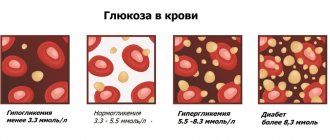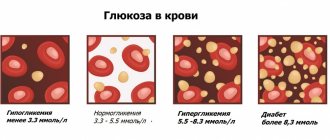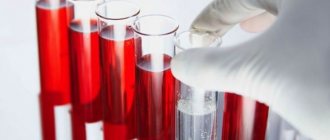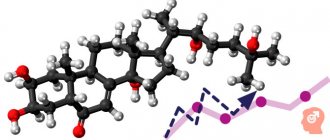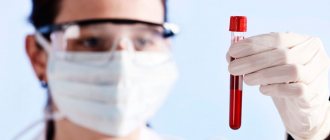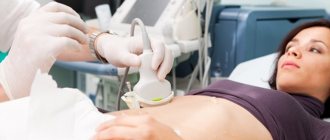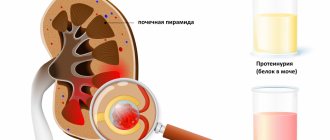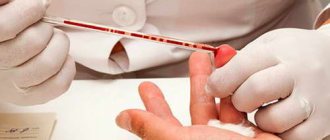General information
Glucose (a simple carbohydrate, monosaccharide) enters the body with food. During the breakdown of saccharide, a certain amount of energy is released, which is necessary for all human cells, tissues and organs to maintain their normal functioning.
The concentration of glucose in the blood is one of the main criteria for assessing a person’s health status. A change in the blood sugar balance in one direction or another (hyper- or hypoglycemia) has the most negative impact on both general well-being and the functionality of all internal organs and systems.
During the digestion process, sugar from food breaks down into individual chemical components, the main one of which is glucose. Its level in the blood is regulated by insulin (a pancreatic hormone). The higher the glucose level, the more insulin is produced. However, the amount of insulin secreted by the pancreas is limited. Then excess sugar is deposited in the liver and muscles in the form of a kind of “sugar reserve” (glycogen), or in the form of triglycerides in fat cells.
Immediately after eating, blood glucose levels rise (normally), but quickly stabilize due to the action of insulin. The rate may decrease after prolonged fasting, intense physical and mental stress. In this case, the pancreas produces another hormone - an insulin antagonist (glucagon), which increases glucose levels, causing liver cells to transform glycogen back into glucose. This is how the body regulates the concentration of blood sugar. The following factors can disrupt it:
- genetic predisposition to diabetes mellitus (impaired glucose metabolism);
- violation of the secretory function of the pancreas;
- autoimmune damage to the pancreas;
- overweight, obesity;
- age-related changes;
- unhealthy diet (predominance of simple carbohydrates in food);
- chronic alcoholism;
- stress.
The most dangerous condition is when the concentration of glucose in the blood increases sharply (hyperglycemia) or decreases (hypoglycemia). In this case, irreversible damage to the tissues of internal organs and systems develops: heart, kidneys, blood vessels, nerve fibers, brain, which can lead to death.
Hyperglycemia can also develop during pregnancy (gestational diabetes). If the problem is not identified in a timely manner and measures are not taken to eliminate it, then a woman’s pregnancy may occur with complications.
Sugar measurement without punctures
Speaking about glucometers, it is impossible not to mention the object of dreams of many diabetics - non-invasive glucometers, that is, those that do not require puncturing the skin. At the moment, there are several such miracle devices on the market with a wide variety of methods for collecting information.
Omelon A-1 is a device that, in the most mysterious way, can determine blood sugar levels by comparing pulse and blood pressure.
Based on the reviews of patients who have tested this device, we can say that someone got very excited with the loud name “glucometer”, because the measurement results are far from the truth and are more reminiscent of a random selection of numbers. This device is not recommended for use in insulin therapy. And it is only suitable for type 2 diabetics (non-insulin dependent).
GlucoTrack is one of the few non-invasive blood glucose meters that has passed quality control in Europe. It is a device whose sensor is designed in the form of an ear clip. The operating principle is hidden in triple analysis: electromagnetic, ultrasonic and thermal. As a result of the combination of these three indicators, it is possible to judge the level of blood sugar with fairly high accuracy.
Indications
A biochemical blood test for sugar is recommended to be done once every 3 years for patients over 40 years of age and once a year for those who are at risk (heredity for diabetes mellitus, obesity, etc.). This will help prevent the development of life-threatening diseases and their complications.
- Preventive examination of patients at risk for diabetes mellitus;
- Diseases of the pituitary gland, thyroid gland, liver, adrenal glands;
- Monitoring the condition of patients with type 1 and type 2 diabetes mellitus receiving treatment, together with analysis for glycated hemoglobin and C-peptide;
- Suspicion of the development of gestational diabetes (24-28 weeks of pregnancy);
- Obesity;
- Prediabetes (impaired glucose tolerance).
Also, an indication for analysis is a combination of symptoms:
- strong thirst;
- frequent urge to urinate;
- rapid weight gain/loss;
- increased appetite;
- increased sweating (hyperhidrosis);
- general weakness and dizziness, loss of consciousness;
- smell of acetone from the mouth;
- increased heart rate (tachycardia);
- visual impairment;
- increased susceptibility to infections.
Risk groups for diabetes:
- Age from 40 years;
- Overweight; (abdominal obesity)
- Genetic predisposition to diabetes.
An endocrinologist, gastroenterologist, therapist, surgeon, pediatrician and other specialized specialists or general practitioners can interpret the results of a blood sugar test.
How to take a blood sugar test correctly
To ensure that the test results do not turn out to be false, it is necessary to follow some rules for preparing the patient for a blood sugar test. Otherwise, you may need to retake the test (which is a waste of your time and money), or an incorrect diagnosis and treatment may be prescribed.
Is it possible to drink water before testing for sugar?
You can drink water. But no more - it is necessary to exclude alcoholic drinks and drinks containing sugar and sweeteners.
Preparing for a glucose test
- On an empty stomach. 8-hour or better 12-hour fasting. Drink only water. Alcohol (it is better to exclude it for 102 days) and sweet drinks are strictly prohibited.
- Better get a good night's sleep
- Avoid intense mental work, stress and outbursts of emotions. The body can increase blood glucose levels during stressful situations. Excessive emotions can suppress insulin production.
- It is better not to brush your teeth with sugar-containing toothpaste.
- No smoking. (if you have diabetes, it is better to avoid smoking altogether)
- Be careful when taking medications. If it is necessary to treat acute or chronic episodes of the disease, you should warn the doctor about the existing problems and reschedule the study or interpret its results in accordance with the ability of some drugs to increase or decrease the studied parameters
- During the period of colds or other acute infections, the result may be false positive
- On the eve of the analysis, you should not take part in feasts, eat heavily before bed, drink alcohol, indulge in fatty foods, fast food, etc.
- Immediately after therapeutic procedures and serious examinations (massage, ultrasound, x-rays, physical therapy), you cannot take a sugar test.
- The day before and before donating blood for sugar, it is better not to engage in active sports. It is better to spend the day and morning before the analysis in a normal, calm manner.
What not to eat before a sugar test
- fatty and spicy foods;
- sweets, cakes and other sweet treats;
- packaged juices;
- sweet sparkling water;
- fast food.
What then can you eat before testing for sugar?
If you need to prepare for a blood glucose test but are feeling hungry, eat something light and healthy. For example:
- boiled/baked chicken
- green vegetables
- cereals
Is it possible to brush your teeth before donating blood for sugar?
It is not recommended to brush your teeth before the examination, because... Toothpastes contain sugar, which is well absorbed through the mucous membrane of the oral cavity and can affect the accuracy of the analysis. Avoid chewing gum as well.
Preparing for a blood sugar test during pregnancy
Preparing for a glucose tolerance test for pregnant women does not differ from the measures listed above. It is recommended to do a glucose tolerance test at 24-28 weeks.
Typically, such a test is prescribed for pregnant women to prevent excessive weight gain in the fetus, which can be caused by an increase in maternal blood sugar levels. And this can happen even if you've never had diabetes. After all, the heavy loads that the body experiences when carrying a fetus can reveal some pathologies that appear exclusively while expecting a baby. These diseases include diabetes mellitus.
Return to list
Blood glucose levels
Important! Standards vary depending on the reagents and equipment used in each particular laboratory. Therefore, when interpreting the results, it is necessary to use the standards adopted in the laboratory where the analysis was carried out. You also need to pay attention to units of measurement .
Invitro laboratory standards:
| Age | Glucose level |
| 2 days - 4.3 weeks | 2.8 - 4.4 mmol/l |
| 4.3 weeks - 14 years | 3.3 - 5.6 mmol/l |
| 14 – 60 years | 4.1 - 5.9 mmol/l |
| 60 - 90 years | 4.6 - 6.4 mmol/l |
| over 90 years old | 4.2 - 6.7 mmol/l |
Standards in the Helix laboratory:
| Age | Reference values |
| less than 14 years old | 3.3 - 5.6 mmol/l |
| children over 14 years old, men, non-pregnant women | 4.1 - 6.1 mmol/l |
| pregnant women | 4.1 - 5.1 mmol/l |
Glucose standards, according to the reference book by L. Danilova, 2014:
| Age | Fasting values |
| umbilical cord blood: | 2.5—5.3 mmol/l |
| premature: | 1.1-3.3 mmol/l |
| newborns 1 day: | 1.7—3.3 mmol/l |
| children 1 month: | 2.7—4.4 mmol/l |
| children over 5 years old: | 3.3—5.6 mmol/l |
| adults: | |
| up to 60 years: | 3.5—5.5 mmol/l |
| over 60 years old: | 4.6—6.4 mmol/l |
Reference values taken from the reference book by A. Kishkun, 2007:
| Age | Plasma glucose concentration | |
| mmol/l | mg/dl | |
| Newborns | 2,8-4,4 | 50-115 |
| Children | 3,9-5,8 | 70-105 |
| Adults | 3,9-6,1 | 70-110 |
Important! The interpretation of the results is always carried out comprehensively. It is impossible to make an accurate diagnosis based on only one analysis.
Consequences of abnormal blood sugar levels
Both high and low blood glucose levels can lead to severe health problems.
Increased blood sugar is manifested by excessive thirst, increased urination, weight loss, fatigue, blurred vision, dry or itchy skin. Acute hyperglycemia can lead to ketoacidosis, severe dehydration, and hyperglycemic coma. Patients with high blood sugar note poor body resistance to infections and delayed wound healing. Also, high levels of glucose in the blood damage blood vessels. This can result in heart disease, stroke, kidney damage, and damage to the nerves and retina of the eyes (retinopathy).
A decrease in blood glucose leads to nervous excitability, tremors, increased heart rate, increased blood pressure, and a feeling of hunger. There is a decrease in concentration, weakness, nausea, dizziness or headache. With a critical decrease in blood sugar concentration, double vision, loss of coordination of movements, drowsiness, loss of consciousness, and hypoglycemic coma appear.
High glucose (hyperglycemia)
- Diabetes mellitus: 7.0 mmol/l and higher on an empty stomach;
- 11.1 mmol/l and higher 2 hours after eating.
Provoking factors:
- stress as a result of severe injury, complex surgery, heart attack or stroke, painful shock;
- unbalanced diet (predominance of foods containing large amounts of carbohydrates in the menu);
- taking medications: diuretics, antidepressants, corticosteroids, hormones, salicylates, lithium, Dilantin, epinephrine, etc.
Recent research suggests that elevated blood glucose levels increase the risk of liver cancer in people with prediabetes and diabetes.
References
- Tuzhilkin, V.I., Sherman, S.V., Bodin, A.B. About the role of sugar in the modern world. Part I. Food industry, 2012. - No. 7.
- Type 2 diabetes mellitus in adults. Clinical recommendations. Russian Association of Endocrinologists, 2021. - 228 p.
- Semashko, T., Lobanok, A., Shtyrov, A., et al. Biosensors for detecting glucose in the blood of diabetic patients. Science and Innovation, 2021. - No. 179. — P. 73-78.
- Ametov, A.S., Chernikova, N.A., Pugovkina, Ya.V. Glucose homeostasis in a healthy person under various conditions. Modern look. Endocrinology: News. Opinions. Training, 2021. - No. 1 (14).
Low glucose (hypoglycemia)
- Pancreatic dysfunction;
- Hypothyroidism (insufficient production of thyroid hormones);
- Insulinoma (usually a benign neoplasm that is capable of secreting insulin);
- Diseases of the liver, kidneys, adrenal glands, incl. malignant;
- adrenal insufficiency (Addison's disease);
- Hypopituitarism (impaired secretion of hormones by the pituitary gland);
- Glycogenosis (a group of hereditary diseases caused by disruption of the process of synthesis and breakdown of glycogen due to existing defects in various enzymes).
Provoking factors:
- prolonged fasting, following a strict diet or fasting;
- disruption of the gastrointestinal tract, autonomic disorders, postoperative conditions;
- overdose of insulin or other glucose-lowering drugs;
- intoxication (poisoning) with arsenic;
- alcohol abuse;
- heavy physical activity;
- feverish conditions;
- taking medications: steroids, amphetamine, etc.
Preparing for analysis
The biomaterial for research is venous or capillary blood, which is collected according to standard algorithms.
- Blood sampling is performed in the morning (8.00 – 11.00) and strictly on an empty stomach. The last meal should be at least 8-14 hours before the procedure;
- The day before, you should not overindulge in sweets, fatty and fried foods;
- Also, the day before the test, it is necessary to exclude the consumption of alcohol and energy drinks;
- It is not recommended to smoke 3-4 hours before blood sampling;
- On the day of the examination, you need to protect yourself from any physical and psycho-emotional stress.
